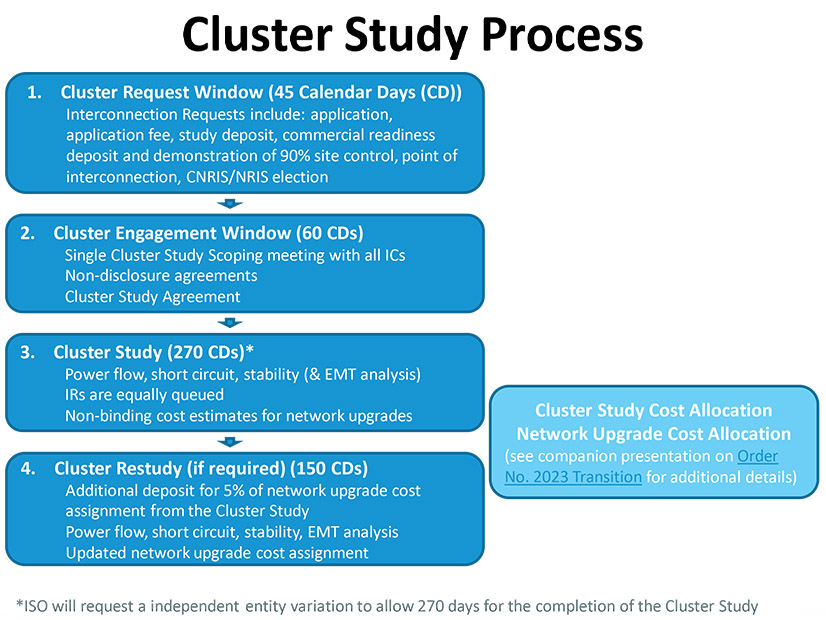WESTBOROUGH, Mass. — ISO-NE outlined its proposed compliance with FERC Order 2023 at Wednesday’s meeting of the NEPOOL Transmission Committee, detailing plans to revamp its interconnection processes.
The RTO said it plans to adopt most of the order’s requirements but will request independent entity variations related to its operating assumptions for storage resources and the cluster study timeframe, proposing a cluster study length of 270 days, compared to the order’s 150 days.
Al McBride, director of transmission services and resource qualification at ISO-NE, said this timeline would be “consistent with established timeline for System Impact Studies in New England.”
McBride added that uncertainty around how many projects will request interconnection in any given cluster, coupled with the lack of standardization for generation equipment, makes it difficult to guarantee a 150-day cluster study timeline. Also, ISO-NE proposed to establish a uniform $250,000-cluster study deposit, consistent with Large Generator Interconnection Procedures requirements.
ISO-NE’s proposed Order 2023 compliance would require interconnection requests to be submitted during a specified period lasting 45 days, which would be followed by a 60-day engagement window featuring a single cluster study scoping meeting. The RTO then would undergo the 270-day cluster study process, which would be followed by a potential cluster restudy period lasting 150 days.
Adding up all the steps, the process would take 525 days — or just under a year and a half — if all steps proceeded in immediate succession.
Some stakeholders have expressed concern about extending the cluster study length from 150 to 270 days. Alex Lawton of Advanced Energy United (AEU) told RTO Insider in a statement that the AEU is reviewing the compliance proposals but that it “encourages ISO to adhere to Order 2023’s 150-day cluster study duration, propose a study duration shorter than 270 days, and work with stakeholders to effect changes that are necessary for the ISO to confidently conduct cluster studies in a timely manner that is aligned with Order 2023.”
Lawton said ISO-NE should require transmission owners to attend the study scoping meeting in the engagement window, which is not mandated by Order 2023. He added that AEU hopes to see more information on cluster subgrouping, the effect of cascading restudies on subsequent clusters, study assumptions for storage and the ways ISO-NE will consider grid-enhancing technologies.
ISO-NE said the presentations were intended to initiate conversations with stakeholders and welcomed feedback on the proposals.
The RTO said it is preparing an alternative proposal for storage operating assumptions that will “no longer study storage resources charging at peak-load conditions” and will “avoid incorporating additional control technologies.” The RTO plans to provide more detail on the treatment of storage resources at the October Transmission Committee meeting.
Capacity Interconnection
ISO-NE also presented to the TC on changes to its capacity interconnection processes, which will be separated from the Forward Capacity Auction process in response to Order 2023.
In the current process, capacity interconnection is connected to the Forward Capacity Market (FCM) and requires new resources to participate in FCM qualification and obtain a capacity supply obligation (CSO).
Alex Rost of ISO-NE said the current process will not be compatible with the requirements of Order 2023. To comply with the order, the RTO will “move all steps of the capacity interconnection process into the overall interconnection process.”
Rost added that ISO-NE will evaluate capacity network resource interconnection service (CNRIS) requests within each cluster.
“Achieving a CSO in the Forward Capacity Market would no longer be a milestone to achieving CNRIS,” Rost said. “CNRIS would be achieved by completing the interconnection process and entering commercial operation.”
Transition Process
Jody Truswell of ISO-NE presented on the RTO’s proposed transition process, which would begin soon after the compliance filing, and “be the most impactful for active projects in the ISO interconnection queue,” Truswell said.
“Interconnection customers will need to make decisions shortly after the ISO files its compliance package regarding how they plan to proceed,” Truswell said.
Assuming no extensions to the compliance deadline, interconnection requests would need to be “deemed valid” by Jan. 4 to be included in the transition process. If projects missed this deadline, they would need to wait until the first cluster entry window opened, which ISO-NE projected to be in mid-2025. ISO-NE is proposing an effective date of March 1, 2024, to initiate the transition study process.
Truswell also proposed that two ongoing cluster efforts — the Third Maine Regional Integration Study and the Cape Cod Cluster System Impact Study — proceed as planned.




